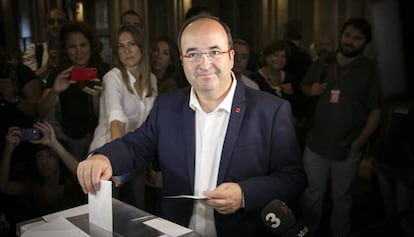Unionist parties to benefit most from expected record turnout at Catalan elections
Ciudadanos and Socialists are set to gain seats, while the Popular Party will plummet according to the polls

Opinion polls indicate that turnout at the Catalan elections of December 21 could be in the 80% range, a figure that would shatter the record of 74.95% set in September 2015.
Experts believe that this unprecedented participation will mainly benefit anti-independence parties, in particular the Catalan Socialists (PSC) and Ciudadanos. This, they say, is because Catalans who wish to remain a part of Spain are now highly motivated to go and vote, whereas in the past many felt that regional elections were not something that affected them directly.
Separatism may have reached its electoral ceiling two years ago
Secessionists, for their part, have been highly mobilized for years. Gabriel Colomé, head of the Catalan government’s Opinion Studies Center, feels that separatism may have already reached its electoral ceiling two years ago, and that increased turnout rates will not help their cause.
In addition to this, “they are no longer running together, but are instead rivals, and some of those voters could choose to punish them or turn to the CUP.” In 2015, the European Democratic Party of Catalonia (PDeCAT) and the Catalan Republican Left (ERC) teamed up in the Junts pel Si (Together for Yes) coalition, which attracted under 50% of the vote but enough seats for a minority government that secured parliamentary support from the far-left CUP group.
Unusual situation
This unusual voter motivation reflects highly unusual circumstances in Catalonia itself: the region’s powers of self-government have been partially suspended since late October, when separatist leaders in the region passed a unilateral declaration of independence through parliament. The emergency measures were introduced after Madrid invoked Article 155 of the Constitution for the first time in Spain’s modern democratic history.
And the race for office is also unprecedented: the ousted premier, Carles Puigdemont is campaigning for the Catalan presidency from Belgium, where he fled to avoid action by the Spanish courts. And several separatist candidates, including former deputy premier Oriol Junqueras (ERC), are campaigning from prison, where they are being held in pre-trial custody while the courts investigate charges of rebellion and misuse of public funds during the independence push.
At the previous regional election of September 27, 2015, the turnout rate grew by nearly 7% and made the unionist party Ciudadanos the second-largest force in the Catalan parliament, where it gained 25 seats. The Catalan Socialists retreated to a rock-bottom 16 seats, but could put in a much stronger performance this time around.
Unionist Catalans used to feel that regional elections did not affect them much
“The PSC has managed to convey a clear message following the crisis of three years ago,” says Colomé.
The big loser on December 21, according to the opinion polls, will be the Catalan branch of the conservative Popular Party (PP), which is currently in power in the central government.
Colomé notes that the election will be mostly decided in Barcelona province, which contributes 85 of the 135 seats in the regional assembly, and most particularly in the Barcelona city metro area, where most of the population resides. This electorate has traditionally had high abstention rates.
In another departure from the norm since regional elections were first held here in 1986, the polls will be taking place on a weekday, a fact that could drive up participation because businesses are giving workers four hours off that day to cast their vote.
English version by Susana Urra.
A march in Brussels
Two pro-independence associations have organized a demonstration on the streets of Brussels’ European neighborhood for Thursday. Their goal is to drum up support for Catalan independence abroad, to portray the Spanish government as undemocratic, and to get the EU involved in the crisis. Ousted Catalan premier Carles Puigdemont is currently living in Brussels, and campaigning from there for the December 21 election.
Police sources said they expected around 20,000 people to participate in the march, which is being organized by ANC and Òmnium, two Catalan civic associations that were particularly active in the pro-independence push. Their leaders, Jordi Cuixart and Jordi Sànchez, have been in pre-trial detention since October for their role in a siege of the Catalan economic department while the police were conducting a search there.
Tu suscripción se está usando en otro dispositivo
¿Quieres añadir otro usuario a tu suscripción?
Si continúas leyendo en este dispositivo, no se podrá leer en el otro.
FlechaTu suscripción se está usando en otro dispositivo y solo puedes acceder a EL PAÍS desde un dispositivo a la vez.
Si quieres compartir tu cuenta, cambia tu suscripción a la modalidad Premium, así podrás añadir otro usuario. Cada uno accederá con su propia cuenta de email, lo que os permitirá personalizar vuestra experiencia en EL PAÍS.
¿Tienes una suscripción de empresa? Accede aquí para contratar más cuentas.
En el caso de no saber quién está usando tu cuenta, te recomendamos cambiar tu contraseña aquí.
Si decides continuar compartiendo tu cuenta, este mensaje se mostrará en tu dispositivo y en el de la otra persona que está usando tu cuenta de forma indefinida, afectando a tu experiencia de lectura. Puedes consultar aquí los términos y condiciones de la suscripción digital.








































